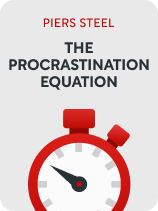

This article is an excerpt from the Shortform book guide to "The Procrastination Equation" by Piers Steel. Shortform has the world's best summaries and analyses of books you should be reading.
Like this article? Sign up for a free trial here.
What are the negative effects of procrastination? How does procrastination affect your health and finances?
Procrastination doesn’t just prevent you from getting work done. It can have a drastic impact on your health and finances if it gets out of control.
Check out the negative consequences of procrastination to see why you need to get your work habits in shape.
The Negative Consequences of Procrastination
No matter why we do it, there are many negative effects of procrastination, especially when it becomes chronic. The Procrastination Equation by Piers Steel asserts that chronic procrastinators are less successful and satisfied in all realms of life.
(Shortform note: Almost everyone procrastinates sometimes, but only a fraction of people qualify as chronic procrastinators. To determine whether you fall into the latter category, look for the following signs: 1) You consistently struggle to meet deadlines. 2) Procrastination affects your relationships with friends and family. 3) You procrastinate in multiple realms of your life (at work, at home, with friends, and so on). 4) The stress of putting things off affects your sleep and physical health.)
Here, we’ll spotlight how procrastination impacts two realms of life: health and financial success.
Realm #1: Health
According to the author, one of the most common things people procrastinate on is routine medical care, which can have serious implications for health and longevity. Many diseases and infections are easier to treat when they’re caught early, but people still postpone doctor’s visits and preventive screenings because they’re unpleasant. Due to these delays, procrastinators are often less healthy than people who struggle less with procrastination.
(Shortform note: Along with delaying health visits, procrastination may more directly contribute to common health problems. One recent study suggests that chronic procrastination is associated with increased rates of hypertension and cardiovascular disease because of the stress it puts on the mind and body. Results still indicated this connection when researchers controlled for age, race, and educational level (other factors that influence the risk of these health problems). Chronic procrastination and resulting stress also increase instances of headaches, insomnia, cold and flu infections, and digestive problems.)
Likewise, the traits that typically accompany the tendency to procrastinate—such as impulsivity and lack of self-control—make procrastinators more susceptible to unhealthy habits, including excessive alcohol consumption and smoking. These habits represent short-term pleasure, which procrastinators favor over long-term health outcomes.
| Using If-Then Plans to Curb Bad Habits If, like many chronic procrastinators, you’re susceptible to unhealthy impulses and vices, consider using “if-then” plans to break bad habits. These plans connect a triggering situation to a concrete action that’s an alternative to the bad habit. Repeatedly using your if-then plans strengthens your association between temptation cues and your more positive, constructive response. For example, maybe you frequently drink alcohol on weekday evenings, and you want to stop because it decreases the quality of your sleep. You might create an if-then plan that says, “If it’s a weekday evening, then I’ll drink water instead of alcohol.” Or, perhaps you smoke most often during work breaks; your if-then plan could be, “If I’m at work, then I’ll chew nicotine gum instead of smoking.” |
Realm #2: Financial Success
Steel argues that procrastinators are typically less financially successful than their peers. Procrastinators often delay paying off debt, meaning they end up paying more in fees and interest. Additionally, they typically wait much longer to start saving for retirement, so they end up without enough money in old age.
| Tips for Starting to Work on Your Finances Financial experts offer many tips for working through common forms of financial procrastination: Tip #1: Start getting your finances in order before you feel ready. Many people procrastinate on saving with the excuse that they’ll start when they have more money. However, waiting until you can save more often means that you never save (since, in theory, you could always earn more than you currently do). So, it’s better to start with what you have, even if it isn’t a lot. Tip #2: Focus on one area of your finances at a time. If you’re just starting to work on your finances, you might feel overwhelmed when confronted with all the tasks ahead. Then, you might feel the urge to procrastinate. To avoid this, choose one aspect of your finances to focus on at a time. Start by tracking your income and spending, so you know what you have and what you’re spending your money on. You can identify areas of overspending and then make cuts. Then, begin working on saving for retirement and paying off debt. Tip #3: Schedule time every week to look over your finances. So you don’t back out of it, treat this time as if it’s time scheduled with a friend. Reviewing your finances regularly makes it a habit, and you also ensure you’re on track with your savings goals and payments. That way, you avoid fees and interest from making late payments. |

———End of Preview———
Like what you just read? Read the rest of the world's best book summary and analysis of Piers Steel's "The Procrastination Equation" at Shortform.
Here's what you'll find in our full The Procrastination Equation summary:
- Strategies to help procrastinators increase their motivation and control
- How to make unpleasant tasks feel more valuable for yourself
- Why procrastinators are typically less financially successful






